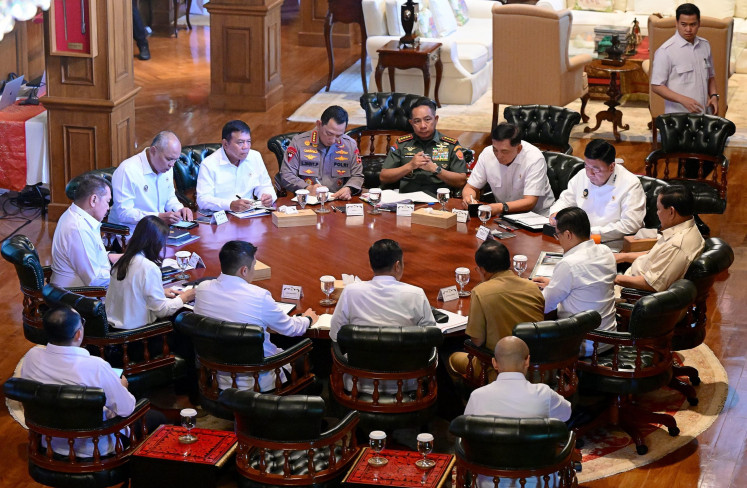Popular Reads
Top Results
Can't find what you're looking for?
View all search resultsPopular Reads
Top Results
Can't find what you're looking for?
View all search resultsASEAN chiefs adopt Phnom Penh accord
The leaders of ASEAN’s member nations concluded the association’s 21st summit on Wednesday, adopting the so-called Phnom Penh agenda and claiming progress on settling maritime disputes with China
Change text size
Gift Premium Articles
to Anyone
T
he leaders of ASEAN’s member nations concluded the association’s 21st summit on Wednesday, adopting the so-called Phnom Penh agenda and claiming progress on settling maritime disputes with China.
Cambodian Prime Minister Hun Sen said in Phnom Penh that the agenda would focus on addressing ASEAN’s challenges and prioritizing measures to realize the ASEAN Economic Community by 2015.
“We strongly believe that the measures agreed and laid down in the framework of the Phnom Penh agenda will become an effective means for addressing our major challenges,” he said during the press conference held after the conclusion of the summit.
The challenges were reducing development gaps in the region, implementing the master plan on ASEAN connectivity and promoting cooperation in other sectors, such as the protection of migrant workers and enhancing disaster management, Hun Sen said.
ASEAN leaders made progress on presenting a united front on the sensitive issue of the conflicting territorial claims in the South China Sea held by several member nations, he added.
ASEAN member nations Brunei, Malaysia and the Philippines, in addition to China and Taiwan, have made claims to the Spratly Islands, a fecund fishing ground and an area rich in oil and gas deposits.
Indonesian Foreign Minister Marty Natalegawa said that ASEAN would formulate a code of conduct for resolving disputes while continuing to promote negotiations with China through the association.
“The big picture is the one that must not be lost,” he said as quoted by Reuters. “In contrast to the recent past, now we have a situation where all are basically rushing and competing to get the Code of Conduct off the ground.”
The leaders also adopted the Phnom Penh Agenda for ASEAN Community Building, a road map for the issues that Cambodia plans to focus on while it holds the association’s rotating chair in 2012.
The Declaration on a Drug-Free ASEAN 2015 and the Malaysian-backed Concept Paper on Global Movement of Moderates, which aims to avert rising extremism in the region, were also adopted.
During the two-day summit, ASEAN’s leaders also agreed to a Cambodian proposal to double the size of the existing regional currency pool to US$240 billion, to address regional migrant worker issues and to bridge development gaps between member nations. The leaders also evaluated the progress of member nations in realizing the ASEAN Economic Community, concluding that all members were on track with their commitments.
During the summit, ASEAN ministers agreed to step up efforts to consolidate free trade agreements with some of the region’s major trading partners such as Australia, China, India, Japan, South Korea and New Zealand — under the so-called “ASEAN+6” Regional Comprehensive Economic Partnership.
Indonesia has been designated to lead a working group on trade in goods that will convene in April.
Iman Pambagyo, the Trade Ministry’s international trade cooperation chief, said that ASEAN, under Cambodia’s leadership in 2012, would also focus on developing small and medium enterprises, trade and investment, infrastructure and connectivity, subregional and regional development and food and energy security.
Key points of Phnom Penh Declaration:
• Continue global nuclear non-proliferation and disarmament efforts by maintaining Southeast Asia as a nuclear weapons, and weapons of mass destruction, free zone.
• Continue to uphold the commitments of the Declaration on the Conduct of Parties in the South China Sea (DOC) and principles of international law, including the 1982 United Nations Convention on the Law of the Sea
• Encourage greater intra-ASEAN mobility, including realization of a visa exemption regime for ASEAN nationals as well as progressive visa relaxations and an ASEAN common visa for non-ASEAN nationals.
• Continue toward the establishment of an ASEAN Economic Community (AEC) by 2015 through implementation of the AEC blueprint.
• Engage ASEAN’s free trade agreement (FTA) partners through initiatives to broaden and deepen ASEAN’s economic relations with the global community.
• Advance ASEAN’s common interests at the global level and ensure increased ASEAN role in global challenges as well as establishing ASEAN as a reliable regional player through the Bali Declaration on ASEAN Community in a Global Community of Nations (Bali Concord III).










